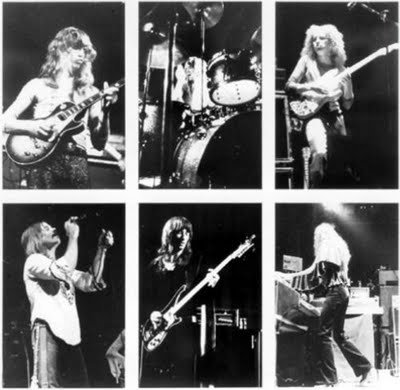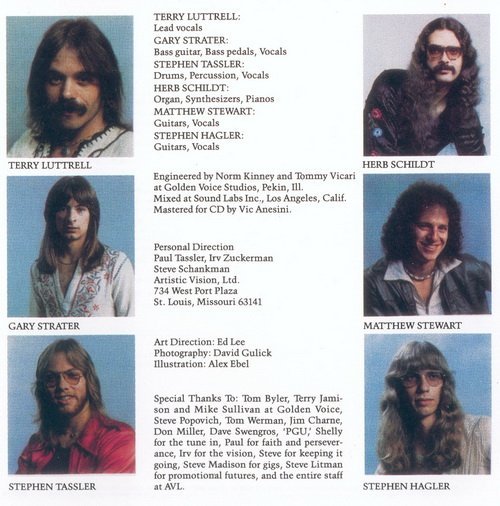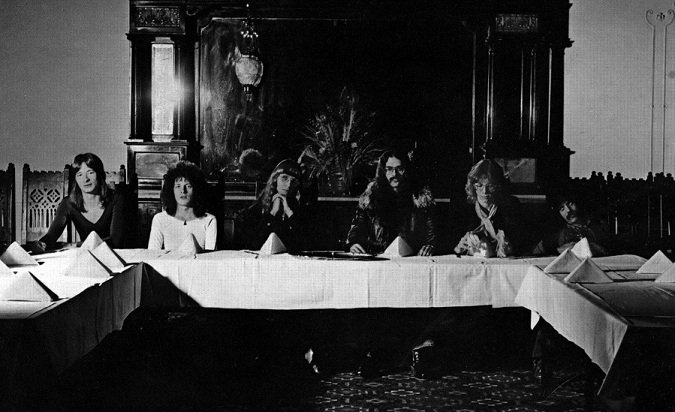STARCASTLE - S/T: Always Say "Yes" To Yes
Mention the band Starcastle in a discussion about prog rock and it's inevitable that a debate will follow over whether or not they were the ultimate Yes clone band. Many armchair critics and smartypants prog fans say yes, the members of Starcastle and the band's fans deny it... and round and round the debate goes. Does either side have a leg to stand out or is this one of those insufferable, circular debates that only diehard art-rock nerds care about? The truth is both sides of the debate are somewhat correct. If you want to accuse Starcastle of heavily borrowing from Yes, you have plenty of proof. As is the case with Yes, the music of Starcastle features celestial word-salad lyrics, a certain irrepressible post-hippie sunniness in both mood and song subjects and flashy playing directed towards a complex sense of melody.If you want to go super-specific, Starcastle also utilizes key elements of the classic Yes sound. The keyboards utilize a mix of crunching organ and slithery analog synths, including a specific Moog-ish tone that sounds like Rick Wakeman's synth playing on "And You And I." The twin-guitar section does a lot of Steve Howe-style slide guitar and acoustic picking while the bass playing favors that treble-heavy Chris Squire approach. Most importantly, vocalist Terry Luttrell uses an airy, elfin vocal style right out of the Jon Anderson playbook and there is a lot of dual-harmony vocalizing in the Anderson/Squire style.However, Starcastle offers their own spin on these familiar elements. They apply the Yes-style affectations in their musical approach towards a songwriting style that is more streamlined in a Kansas-style pomp-rock vein. They avoid side-length epics, with the l
The truth is both sides of the debate are somewhat correct. If you want to accuse Starcastle of heavily borrowing from Yes, you have plenty of proof. As is the case with Yes, the music of Starcastle features celestial word-salad lyrics, a certain irrepressible post-hippie sunniness in both mood and song subjects and flashy playing directed towards a complex sense of melody.If you want to go super-specific, Starcastle also utilizes key elements of the classic Yes sound. The keyboards utilize a mix of crunching organ and slithery analog synths, including a specific Moog-ish tone that sounds like Rick Wakeman's synth playing on "And You And I." The twin-guitar section does a lot of Steve Howe-style slide guitar and acoustic picking while the bass playing favors that treble-heavy Chris Squire approach. Most importantly, vocalist Terry Luttrell uses an airy, elfin vocal style right out of the Jon Anderson playbook and there is a lot of dual-harmony vocalizing in the Anderson/Squire style.However, Starcastle offers their own spin on these familiar elements. They apply the Yes-style affectations in their musical approach towards a songwriting style that is more streamlined in a Kansas-style pomp-rock vein. They avoid side-length epics, with the l ongest song maxing out at a mere ten minutes. They also incorporate a strong folk-rock influence on some tracks that owes more to Crosby Stills & Nash than it does to Yes.Even more interesting is Starcastle's use of dual guitarists: prog-fan wiseacres say this is to compensate for the lack of a Steve Howe in the ranks but that sarcasm overlooks how inventively Starcastle uses this component of their sound. Guitarists Stephen Hagler and Matthew Stewart forego virtuosic excess, instead going for simple but highly melodic lines that intertwine to create rich textures. The end result sounds like a prog-minded version of the dual-guitar approach that Wishbone Ash favored.And finally, there are the songs themselves, which are consistently strong. "Lady Of The Lake" opens the album on a suitably epic note, creating a kitchen-sink proposition that allows the band to show off their full range of stylings and instrume
ongest song maxing out at a mere ten minutes. They also incorporate a strong folk-rock influence on some tracks that owes more to Crosby Stills & Nash than it does to Yes.Even more interesting is Starcastle's use of dual guitarists: prog-fan wiseacres say this is to compensate for the lack of a Steve Howe in the ranks but that sarcasm overlooks how inventively Starcastle uses this component of their sound. Guitarists Stephen Hagler and Matthew Stewart forego virtuosic excess, instead going for simple but highly melodic lines that intertwine to create rich textures. The end result sounds like a prog-minded version of the dual-guitar approach that Wishbone Ash favored.And finally, there are the songs themselves, which are consistently strong. "Lady Of The Lake" opens the album on a suitably epic note, creating a kitchen-sink proposition that allows the band to show off their full range of stylings and instrume ntation. Yes fans are likely to be amused by a spacey breakdown that approximates the blissed-out soundscapes of Tales From Topographic Oceans and a finale that amusingly evokes "Siberian Khatru."From there on, Starcastle pushes into more interesting territory: "Elliptical Seasons" offers a muscular, arena-style take on folk-rock, complete with surprising bursts of wah-wah'd electric guitar, and "To The Fire Wind" has an energetic, twisty style that feels like Yes-style prog pushed into jazz-fusion territory. Your Humble Reviewer's favorite of the batch is "Sunfield," a stirring blend of folkish pop and driving rock highlighted by a killer sing-along bridge.Ultimately, Starcastle is a killer debut, regardless of how heavily it borrow from Yes. The ensemble playing is tight, the songs are skillfully constructed and the whole thing sounds energetic and inspired from start to finish. Even the production, sometimes
ntation. Yes fans are likely to be amused by a spacey breakdown that approximates the blissed-out soundscapes of Tales From Topographic Oceans and a finale that amusingly evokes "Siberian Khatru."From there on, Starcastle pushes into more interesting territory: "Elliptical Seasons" offers a muscular, arena-style take on folk-rock, complete with surprising bursts of wah-wah'd electric guitar, and "To The Fire Wind" has an energetic, twisty style that feels like Yes-style prog pushed into jazz-fusion territory. Your Humble Reviewer's favorite of the batch is "Sunfield," a stirring blend of folkish pop and driving rock highlighted by a killer sing-along bridge.Ultimately, Starcastle is a killer debut, regardless of how heavily it borrow from Yes. The ensemble playing is tight, the songs are skillfully constructed and the whole thing sounds energetic and inspired from start to finish. Even the production, sometimes  criticized by fans for being a bit dry on effects, has a crisply defined, live-in-the-studio feel that highlights how strong the players are. You can complain about originality if you like but you'll be missing out on all the vintage-prog fun.(CD NOTES: this album has been available for years as a decent-sounding CD from Epic. However, there is a newer edition from Rock Candy Records that has a fresh, punchy remastering job and an informative set of liner notes that incorporate the band's input.)
criticized by fans for being a bit dry on effects, has a crisply defined, live-in-the-studio feel that highlights how strong the players are. You can complain about originality if you like but you'll be missing out on all the vintage-prog fun.(CD NOTES: this album has been available for years as a decent-sounding CD from Epic. However, there is a newer edition from Rock Candy Records that has a fresh, punchy remastering job and an informative set of liner notes that incorporate the band's input.)

